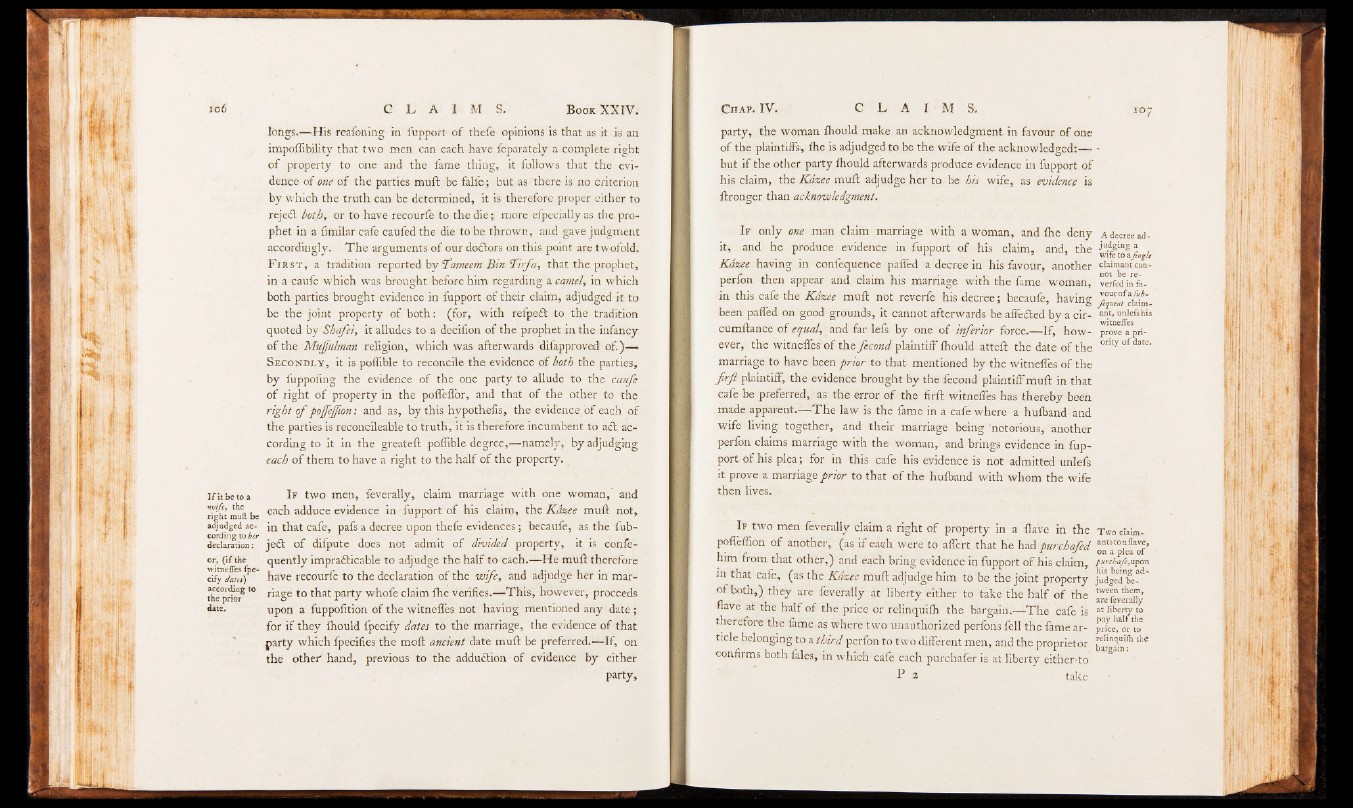
longs.—His reafoning in fupport of thefe opinions is that as it is an
impoffibility that two men can each have feparately a complete right
of property to one and the fame thing, it follows that the evidence
of one of the parties mull: be falfe; but as there is no criterion
by which the truth can be determined, it is therefore proper either to
rejedt both, or to have recourfe to the die; more efpecially as the prophet
in a fimilar cafe caufed the die to be thrown, and gave judgment
accordingly. The arguments of our doftors on this point are twofold.
F irst, a tradition reported by T’ameem Bin Tirfa, that the prophet,
in a caufe which was brought before him regarding a camel, in which
both parties brought evidence in fupport of their claim, adjudged it to
be the joint property of both: (for, with refpedt to the tradition
quoted by Shafei, it alludes to a decilion of the prophet in the infancy
of the Mujfulman religion, which was afterwards difapproved of.)—
S e c o n d l y , it is poffible to reconcile the evidence of both the parties,
by fuppoling the evidence of the one party to allude to the caufe
of right of property in the poffeflor, and that of the other to the
right o f pojfejjion: and as, by this hypothelis, the evidence of each of
the parties is reconcileable to truth, it is therefore incumbent to a£t according
to it in the greateft poffible degree,—namely, by adjudging
each of them to have a right to the half of the property. _
If it be to a I f two men, feverally, claim marriage with one woman, and
right muft be eac^ adduce evidence in fupport of his claim, the Kdzee muft not,
adjudged ac- jn that cafe, pafs a decree upon thefe evidences; becaufe, as the fubcording
to her • . . 7. . . .
declaration: ject of difpute does not admit of divided property, it is confe-
or. (if the quently impracticable to adjudge the half to each.— He muft therefore
cify”!&/«f>e have recourfe to the declaration of the wife, and adjudge her in mar-
the'prio? l° riage t0 that party whofe claim lhe verifies.— This, however, proceeds
date. upon a fuppofition of the witneffes not having mentioned any date;
for if they ftiould fpecify dates to the marriage, the evidence of that
party which fpecifies the moft ancient date muft be preferred.— If, on
the other hand, previous to the adduction of evidence by either
party,
party, the woman fhould make an acknowledgment in favour of one
of the plaintiffs', the is adjudged to be the wife of the acknowledged:— •
but if the other party fhould afterwards produce evidence in fupport of
his claim, the Kdzee muft adjudge her to be his wife, as evidence is
ftronger than acknowledgment.
If only one man claim marriage with a woman, and fhe deny a decree ad-
it, and he produce evidence in fupport of his claim, and, the juAginS ® ,
r r . . ’ wife to afingle
Kdzee having in confequence palled a decree in his favour, another claimant can-
perfon then appear and claim his marriage with the fame woman, “ erfed^n fain
this cafe the Kdzee muft not reverfe his decree; becaufe, having ^«°/daim
been palled on good grounds, it cannot afterwards be affeCted by a cir- a“t- miefshis
cumftance of equal, and far lefs by one of inferior force.—If, how- prove a Pri-
ever, the witneffes' of the fecond plaintiff fhould atteft the date of the onty of date'
marriage to have been prior to that mentioned by the witneffes of the
firft plaintiff, the evidence brought by the fecond plaintiff muft in that
cafe be preferred, as the error of the firft witneffes has thereby been
made apparent.—The law is the lame in a cafe where a hufband and
wife living together, and their marriage being 'notorious* another
perfon claims marriage with the woman, and brings evidence in fupport
of his plea; for in this cafe his evidence is not admitted unlefs
it prove a marriage prior to that of the hufband with whom the wife
then lives.
If two men feverally claim a right of property in a Have in the Two claim-
poffeffion of another, (as if each were to affert that he had purchafed antstof flav?"
nun from that other,) and each bring evidence in fupport of his claim, purchase,upon
in that cafe, (as the Kdzee muft adjudge him to be the joint property j'udgeTbe-'1'
of both,) they are feverally at liberty either to take the half of the ^ “ "^1”;
flave at the half of the price or relinquifh the bargain.—The cafe is at liberty to
therefore the fame.as where two unauthorized perfons fell the fame ar- ^ ^ " 1 0
tide belonging to a third perfon to two different men, and the proprietor the
confirms both fales* in which cafe each purchafer is at liberty eitherto
P 2 ' take